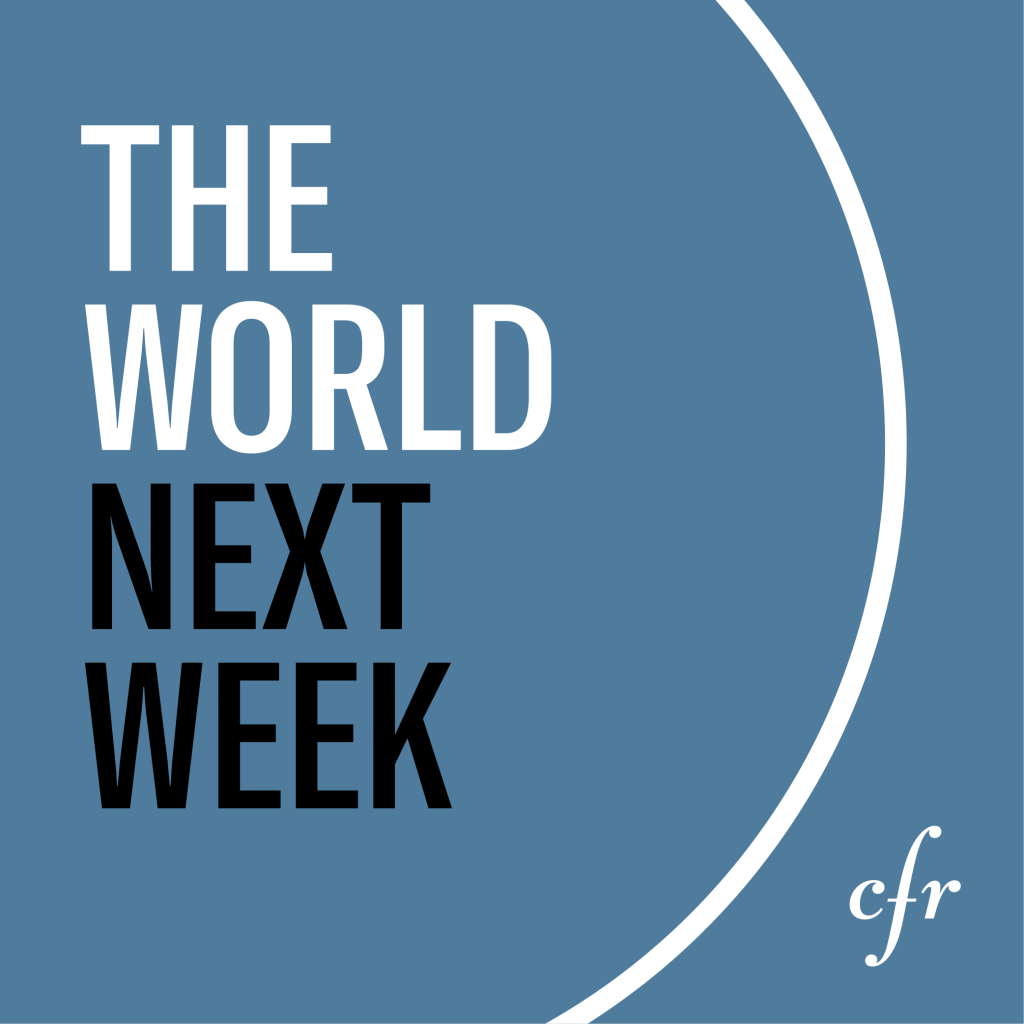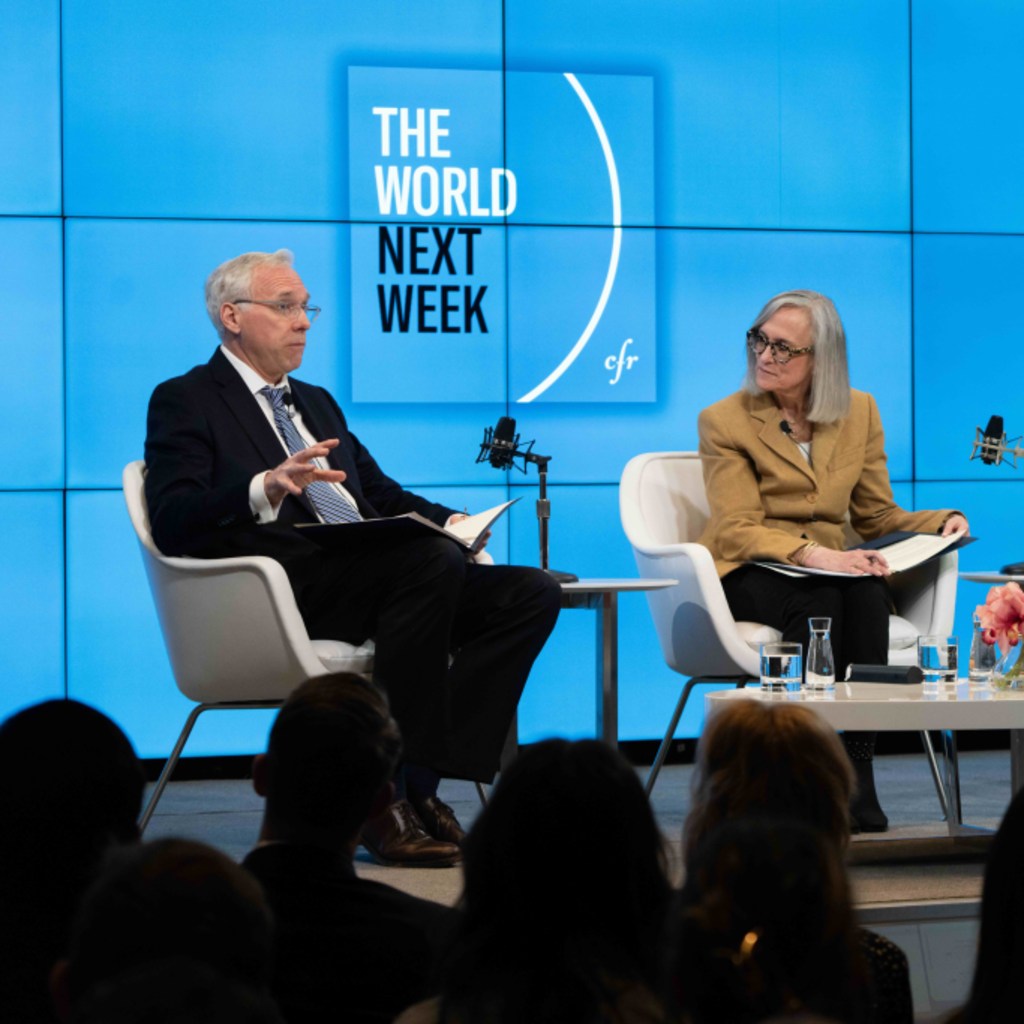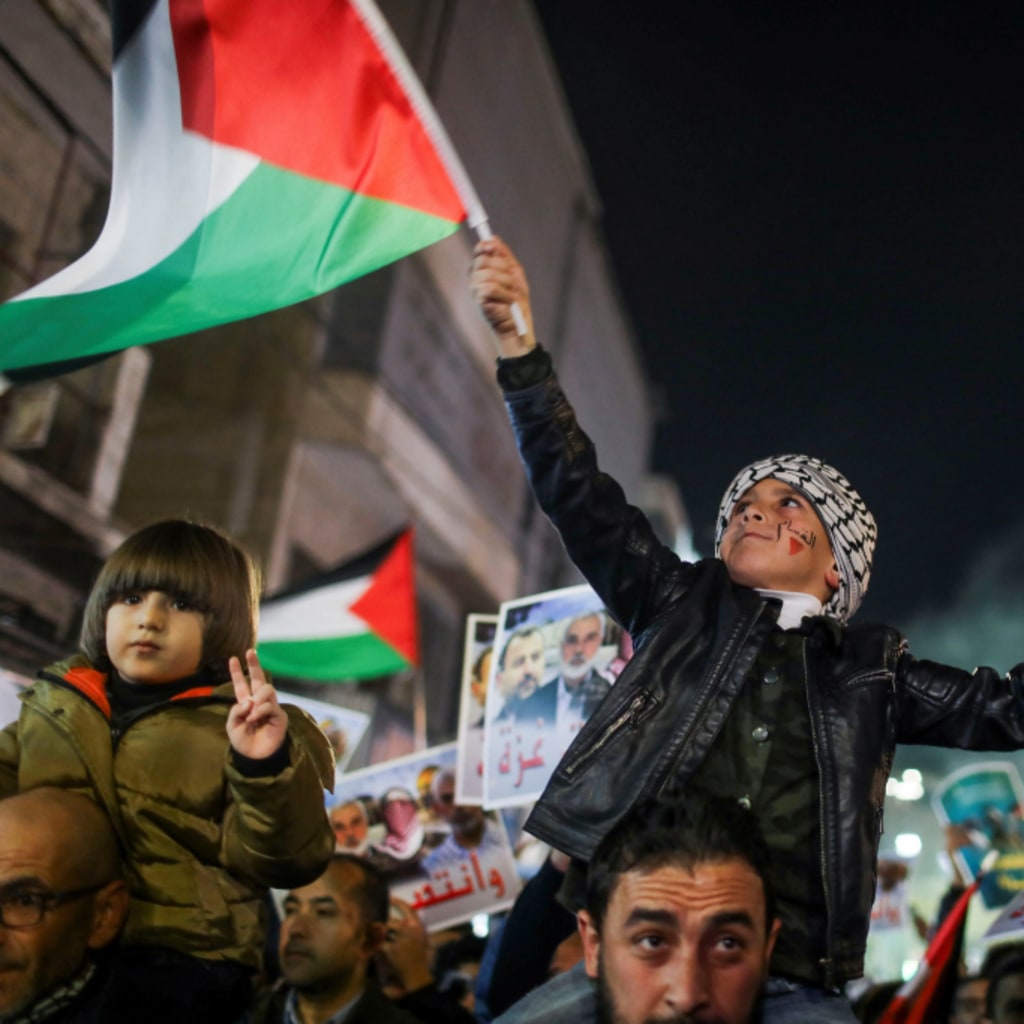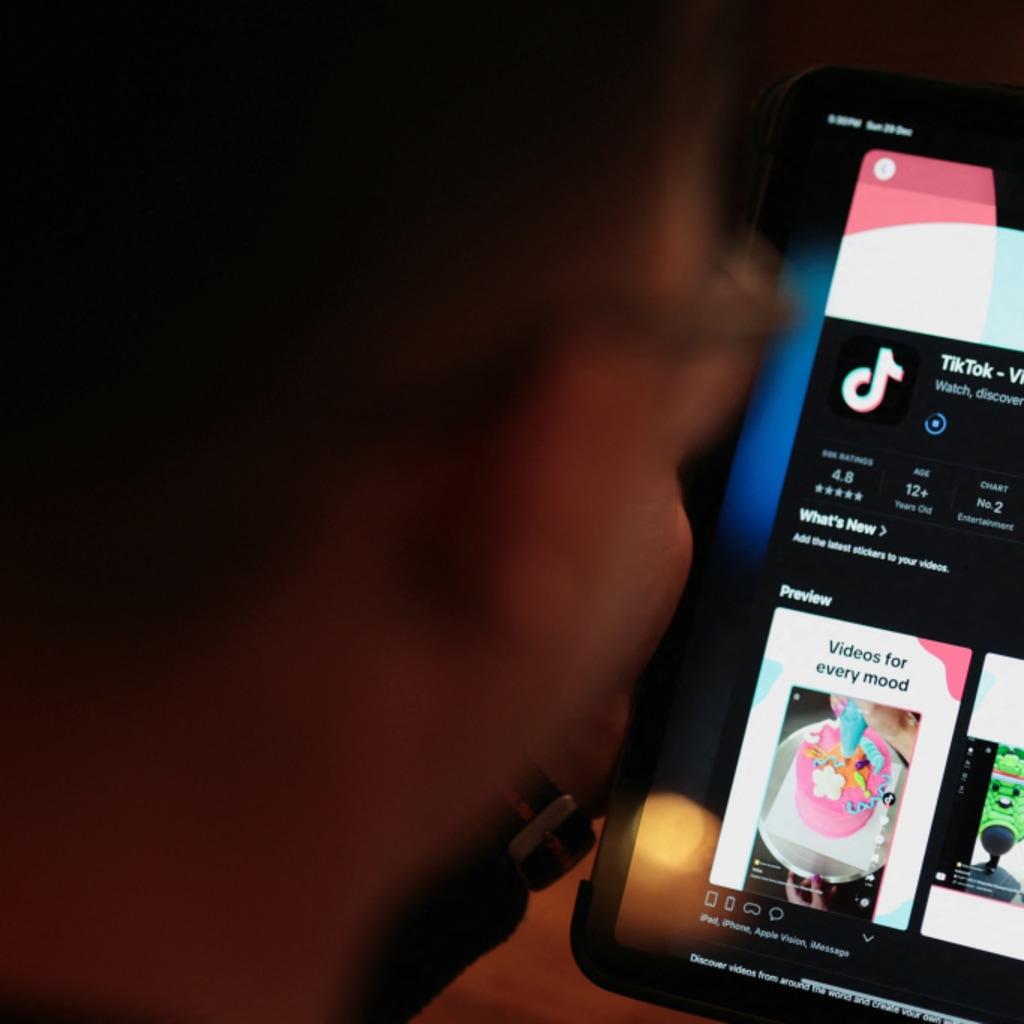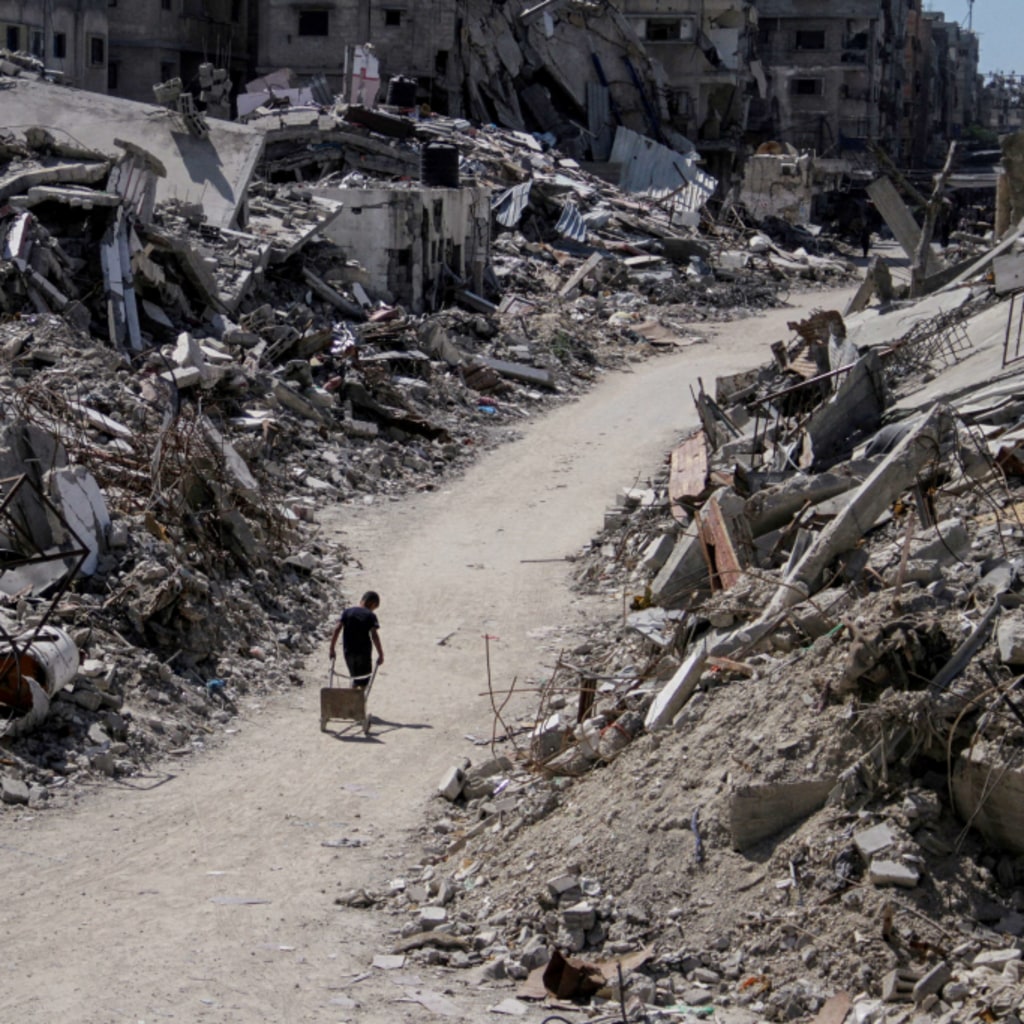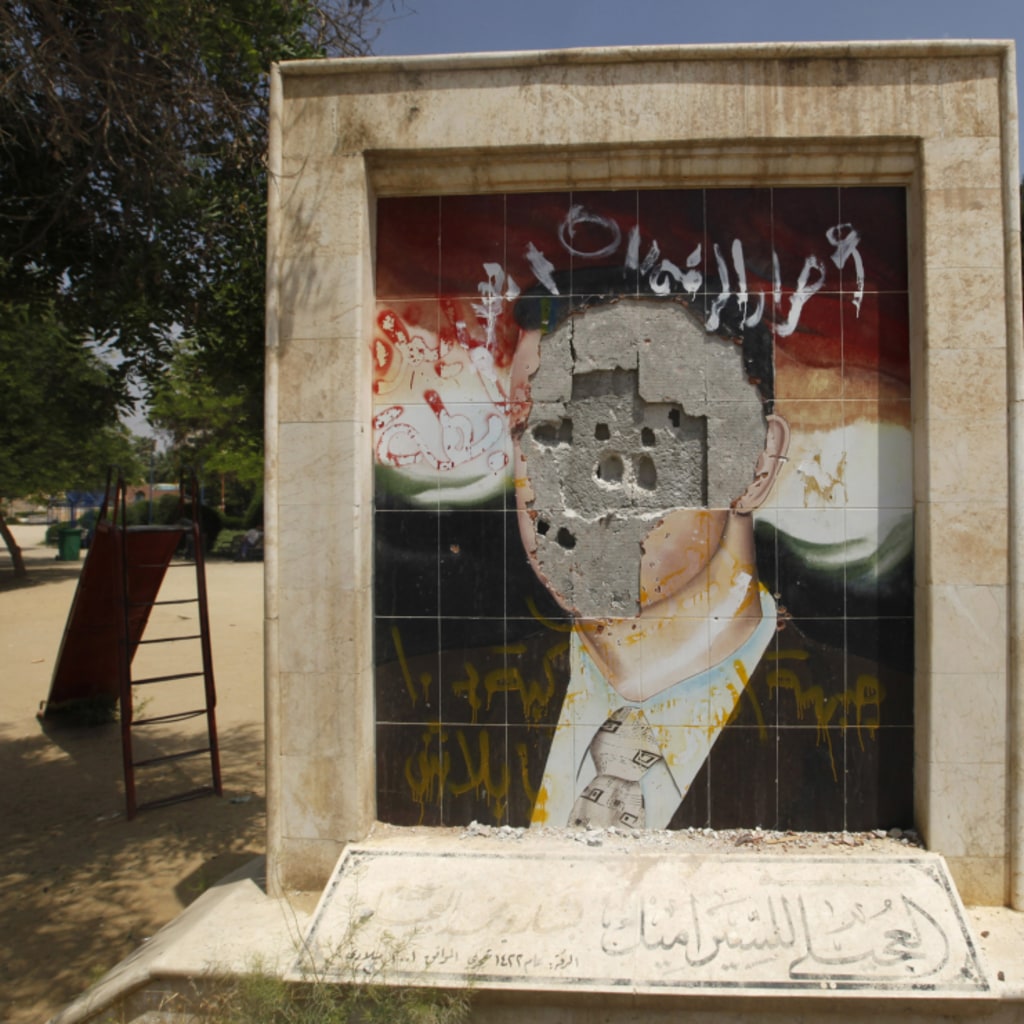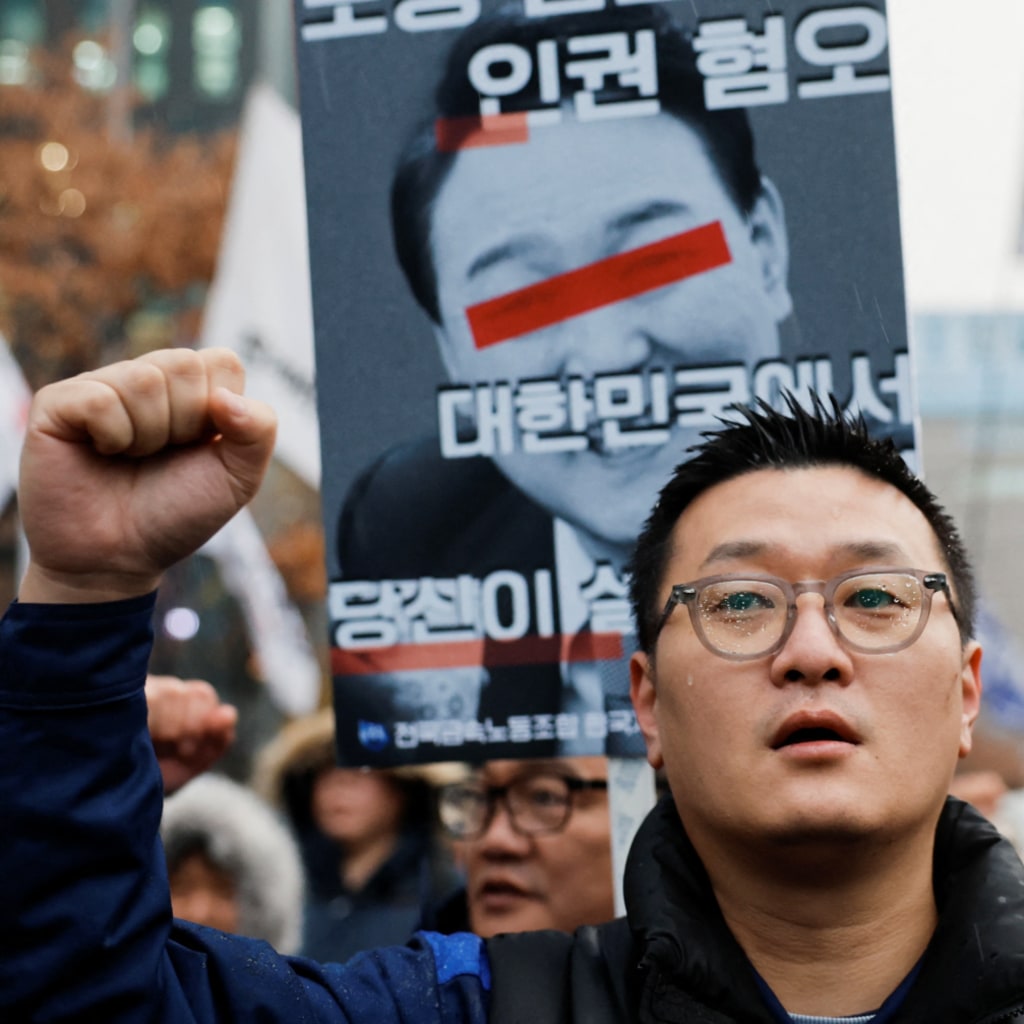Israel’s Rafah Plans, Greece and Turkey Boost Diplomacy, Cannes Festival Unveils New Films, and More
Israel’s newest military operation in the southern Gaza Strip city of Rafah stirs concerns of catastrophe for Palestinians in Gaza, and prompts the United States to condition its offensive military aid for the first time since the Israel-Hamas war broke out; Greek Prime Minister Kyriakos Mitsotakis and Turkish President Recep Tayyip Erdogan meet in Ankara, Turkey, to continue their diplomatic efforts; the seventy-seventh Cannes Film Festival showcases new films ranging from niche to blockbuster; and Russian President Vladimir Putin orders tactical nuclear weapon drills as a signal to the North Atlantic Treaty Organization (NATO).
Published
Hosts
- Robert McMahonManaging Editor
- Carla Anne RobbinsSenior Fellow
Associate Podcast Producer
- Ester FangAssociate Podcast Producer
Editorial Director and Producer
- Gabrielle SierraDirector, Podcasting
Show Notes
Mentioned on the Podcast
Ali Abbasi, The Apprentice
Jacques Audilard, Emilia Perez
Christina Bouri and Diana Roy, “Few Options for Gazans as Israel Enters Rafah,” CFR.org
Francis Ford Coppola, Megalopolis
David Cronenberg, The Shrouds
“Emmanuel Macron In His Own Words,” Economist
Yorgos Lanthimos, Kinds of Kindness
George Miller, Furiosa: A Mad Max Saga
War in Gaza Update: The Rafah Incursion and Negotiations Over Hostage Release and Ceasefire, Council on Foreign Relations
“Why Lithuania is Considering Sending Soldiers to Ukraine,” Financial Times
Transcript
MCMAHON:
In the coming week, Israel’s operation in Rafah draws global attention. Turkish President Erdoğan and Greek Prime Minister Mitsotakis meet in Ankara. And, the Cannes Film Festival premieres dozens of new movies. It’s May 9th, 2024, and time for The World Next Week. I am Bob McMahon.
ROBBINS:
And I’m Carla Anne Robbins. Bob, let’s start in Rafah. This isn’t at least yet the full assault that the Israelis have been threatening and that Washington has been warning against. Still, since Israel began this newest military operation in Eastern Rafah and took full control of border crossing with Egypt, more than a hundred thousand Gazans have been displaced, and vital aid deliveries have been brought to its standstill. And at the same time, Hamas and Israeli delegations, as well as U.S., Egyptian, and Qatari representatives, are in Cairo for cease-fire talks. And for the first time, President Biden has suspended an aid delivery to Israel. Are we any closer to a cease-fire for hostages deal? And what do you think the impact of this U.S. pressure is having on Israeli military decisions?
MCMAHON:
Well, Carla, the latter of those questions is the one that’s particularly intriguing at this moment in time. But just to kind of recap the things you mentioned, it seems like such a long time ago that we had news of Hamas accepting the cease-fire proposal, which was only the start of this week. That, in turn, turned out to be a very transitory moment because it was a deal that they saw that Israelis had said was a bit watered down and it was not acceptable to them. And then Israel, in turn, moved to ratchet up the pressure and mount what they called limited operation in Rafah.
But then you had the ongoing turning up of the pressure from U.S. officials who had been very concerned about the use of heavy U.S. weapons for what they call offensive operations. And so this announcement, first it was the report ultimately confirmed by administration officials that they were holding off on shipping certain very heavy armaments. But then it was President Biden himself saying on CNN that the U.S. would halt shipment of offensive weapons that have been used to kill civilians in Gaza if the Israelis move ahead with a ground invasion of Rafah.
And Biden was quick to say that the U.S. would continue to help Israel with defensive weapons such as the Iron Dome anti-missile system and components, but was trying to draw a line and said Israel had not yet crossed what he called a “red line” on the Rafah invasion. But he was basically laying out markers, and it caused some really sharp reaction, especially from the very right-wing element of the Israeli coalition who referred to it, I believe, as a blockade in one of the comments that came from them.
So you have this other erstwhile, very strong allies obviously, but the U.S. is laying out some markers here because of real alarm at what is transpiring in Rafah. And reports are saying minimally a million, maybe up to 1.4 million civilians, Palestinian civilians, are in this area and could be affected. And there are a few places for them to go that are safe. There have been designated humanitarian areas, but a few feel safe in it. Even if they do...are able to cluster there, the ability to get them food and fuel and other necessary items is limited. The ability to get supplies into Gaza has been constrained. There’s been on-again-off-again reports of border closures.
And one of the things that’s coming out in these reporting, Carla, is the U.S. clearly does not have confidence that the Israelis have a plan for how to deal with the humanitarian fallout from a sustained attack on what the Israelis say are some of the last major Hamas positions in Gaza in this area around Rafah. And there’s lots of good reporting on this circumstance playing out in Rafah. I would note we have a new piece up on CFR.org with a map detailing where Gaza civilians can go and where the military operations are playing out.
So things are really coming to a head. We should say, as we always do when we tape this podcast, some of the things we say could be overtaken by the time this airs. But the way things are looking right now, there’s a lot of pressure on Israel to be restrained, at the very least, offer a more clear-cut humanitarian plan while, as you say, these talks continue, and maybe there’s some sort of leverage being sought that could help influence these talks. It’s not clear, but the talks are continuing. We could end up this week with a real escalation or maybe momentum towards the cease-fire. At this point, it just...the way things have transpired, you could be almost ready for anything on that scale of things, Carla.
ROBBINS:
So we had a media briefing with the Council yesterday with two of our experts, Elliott Abrams and Steven Cook and both of them were very skeptical of the possibility of a cease-fire for hostages agreement. And both of them believe that the Israelis are going to push into Rafah even with the American pressure. They were arguing on the cease-fire front that Hamas and the Israelis just want something different.
Hamas wants a complete end to Israeli military action, and the Israelis want to go for it until Hamas is wiped out. And that it’s just unimaginable they could possibly come to an agreement even though the administration keeps saying, “We’re in a delicate moment,” but that they believe...It’s very hard to tell whether that’s happy talk on their part or they’re just being wishful. Do you have any sense that there’s a possibility for a deal here?
MCMAHON:
I would say, and it’s only a sense. It’s not special intel. But first of all, I would commend that meeting that you mentioned that you moderated yesterday, the media briefing with Steven and Elliott, just because it kind of walked through certainly what the calculations are on both sides and how tough this is, this moment is. Can they agree on a pause that doesn’t include a sustained follow-up pause, which is what Hamas wants? Israelis really do want the hostage released and seem to have been willing to accept a certain limited, at least six weeks or so, pause. Is there a window? Is there a daylight for both sides to agree on just, let’s say, a six-week option? Possibly. I’m not sure. It’s very uncertain whether they’re trying to swing for the fences, so to speak, or will accept something more modest.
I don’t know the dynamic on either side. What we’ve certainly seen in public dynamic with the U.S. pressure on Israelis, we don’t know what kind of pressure Hamas is facing, say, from some of its interlocutors, from Qatar, for example, and whether or not that’s going to work. And you have, at the end of the day, as we’ve talked about many times before, this is a existential struggle. Israelis want to wipe out Hamas. They don’t want this group to exist anymore based on what they did on October 7th. They see them as being able to reconstitute themselves with any sort of a lengthy pause that does not include the eradication of the group or the expunging of them from Gaza. And Hamas does not want to write into an agreement its own extermination, and trying to finesse that seems like it’s really tough.
So I guess I would...my sense, based on your question, Carla is that it seems very dubious, but at the same time, it’s hard to see these Israelis going with a full-fledged ground offensive given what’s now transpiring in terms of U.S. pressure and global pressure too. Although these Israeli’s have said, “We are listening to no one when it comes to our self-defense.”
ROBBINS:
And finally, why do you think this is... we’ve come to this point for Biden? I mean, more than thirty-four thousand people killed in Gaza since this offensive began. Why now for Biden? What is it about Rafah in particular that has led Biden to take the step that many people have been saying, “Condition the aid, condition the aid. There are too many civilians being killed.”
MCMAHON:
Yeah, I think some of it might be just the duration of this. As was pointed out in your media call yesterday, this is the longest-sustained military conflict the Israelis have ever had. And it’s brought about so many new sorts of things, including the sustained impact on a civilian population.
And I think, cumulatively, what U.S. officials have seen transpiring the way it’s gotten into us politics, certainly, we’ve seen it play out on U.S. campuses, college campuses with student protests and calling for divestment even of anything that supports Israel or the Israeli military campaign. That’s not influencing necessarily the administration, but I think it’s a collective sense and a growing number of members of the Democratic Party that are upset about what’s happening and what the Israelis seem to be intent on doing despite the ongoing ports of real concerns, including famine. You had the U.S. head of the World Food Program, Cindy McCain, talking about famine in effect-
ROBBINS:
John McCain’s widow.
MCMAHON:
John McCain’s widow mentioning in northern Gaza, they are seeing signs of famine, for example. And so I think it’s a bunch of these types of developments. Now, we should also keep in mind Biden has been, as you indicated, has been staunchly supportive of Israel throughout this campaign. There’s also reports this week that the administration is holding off on turning in what was expected to be a report on whether Israel had violated U.S. law and whether or not they would not be submitting it to Congress. And that also could have an effect on U.S. legally being able to continue sending aid to Israel.
But the president has lots of levers to support Israel, just like we saw the president using this levers to support Ukraine while there was a congressional impasse. And I think to your question, Carla, he just reached a point of grave concern about what was going on on a humanitarian front and what Rafah means because there is no place for the Palestinians in Rafah to go at this point. They have been moved all around Gaza. Egypt, and Jordan, or nearby countries are not going to accept them. They are bordered on one area by the Mediterranean Sea. There are these humanitarian areas that are seen as precarious, to say the least. There’s just too many signs that this could be a real catastrophe on a humanitarian front, and I think they just kind of reached a limit.
ROBBINS:
An even greater catastrophe.
Bob, let’s head to Ankara, Turkey, not the world’s most interesting city, where President Recep Tayyip Erdoğan is hosting Greek Prime Minister Kiryakos Mitsotakis for a meeting next Monday, May 13th. These two countries really don’t like each other, and they have a lot of unresolved disputes, multiple threats of war, and they’re going to have a high-level meeting. And this is possibly...could be the start of a new chapter between two NATO allies that really...I don’t think you could really call them allies. Why are Greece and Turkey trying to mend their relationship right now?
MCMAHON:
Well, certainly, you can’t find two more antagonistic NATO members than Greece and Turkey. But I do think there’s something to be said for the personal dynamic between the Prime Minister Mitsotakis and President Erdoğan. So they’re meeting in Ankara, and I think they have a bit of momentum. They met in Athens. The previous meeting was in Athens, and they have been sort of dealing with some of the low-hanging fruit-type issues, as they say in diplomatic parlance, in terms of trying to build confidence measures, maintaining military lines of communication, even fostering some trade deals, doing the things that helps both sides feel like, “Hey, we can work together. It doesn’t all have to be shouting at each other.”
They have an enormous number of issues of contention certainly. And there were just recent reminders of that in terms of, on the one hand, you had President Erdoğan formally reopening a former Byzantine-era church as a mosque just in the past week. And the Greeks have criticized that and called on Turkey to protect it as a UN World Heritage site. You have on the side of the Turks being upset at the Greek move to declare two new marine parks, one in the Aegean Sea and the other in the Ionian Sea in contested waters basically. The one in the Aegean Sea, for example, spans some deserted islands and islets that are north of Crete but near the peninsula of the Turkish western Mugla province. And so when you declare marine park, you set aside space for ecological sustainability and so forth, and the Turks see that as a violation of their sovereignty. There are many other issues involving this region and the Eastern Mediterranean in general and especially over energy claims.
And I think this meeting in Ankara is a chance to both sort of talk about areas where they can continue to try to work cooperatively collaboratively together, perhaps, but also to sort of dial down the temperature on the areas of friction. I don’t know what they’re going to be able to say about smoothing over the concerns over the marine park. That seems like an issue that the Greeks are not going to dial back necessarily, but maybe it’s just the fact of continuing to talk, continuing to create assurances on both sides that what they’re doing is not about trying to one-up the other side or make claims against the other side, but is something different.
There are disputes over Cyprus. It’s now fifty years since the division of Cyprus, and you have a Northern Cyprus that’s only recognized by Turkey, for example. The rest of Cyprus is in the EU. That was twenty years ago that that happened. And so, at the same time, the two countries have said, “We have things we can talk about and maybe some positions we can share vis-à-vis what’s going on in the Middle East, what’s going on in Ukraine? How we can possibly be a voice in even in NATO?” So it’s going to be very intriguing. I think this meeting is occurring at a very interesting time where there’s just so much bad news and antagonism going on. You have two countries traditionally at loggerheads trying to kind of forge ahead and kind of make common cause here, Carla.
ROBBINS:
So this basically began in 2022 after the Russian invasion of Ukraine. Is it somehow linked to it, to the Russian invasion, this desire to...Is it one more NATO drawing-together impulse?
MCMAHON:
I don’t think you can rule some elements of that out. I think it’s the combination of these two leaders sort of taking stock of what was happening and deciding, “We have an opportunity here. We have a chance here to kind of smooth over some things.” They had both, by the way, in early 2023 reached deals with the United States for fighter jets. And that had reached concern that they were kind of dialing-up their posturing against each other. And so I think after the fighter jet deal, I think they saw a real need to turn down the temperature to kind of talk with each other to kind of indicate that they are not about trying to make territorial gains using the military force, but in fact, have ways that they can use diplomacy and that the last thing that part of the world needs is another conflict while the Ukraine one is playing out.
And yes, Ukraine is a conflict that has really focused the attention of NATO. NATO certainly has its frictions on some things, but I think you can’t rule that out. Turkey has tried to be a broker in that front, as we know. Certainly, it has a line to Russia that other countries don’t have. So does Greece in a number of ways, partly through the ties of sort of culture and religion going way back. And so I think we should watch this space a little bit more and just see what they’re able to do both in their own bilateral relationships as well as what they might provide in terms of another voice, another perspective on the Ukraine front, or helping shore up that part of NATO. We certainly spent a lot of time talking about the Nordic part of NATO, but this is an interesting other side of NATO.
But Carla, I want to take us to the French Riviera because, on the French Riviera, next Tuesday is the start of the seventy-seventh Cannes Film Festival. Now, every year at Cannes, there are big auteurs and directors and stars who are making great strides or are trying to come out with something new and provocative or exciting. One of the big ones this year is Francis Ford Coppola. George Lucas is also going to be there, Meryl Streep, and a number of others who were vying for the coveted Palme d’Or. The grand prize for the best film. But there are also some disruptions that are playing out on the sidelines, including maybe even some workers strikes that could disrupt things. But Carla, what should we be focusing on as this springtime, this annual springtime occasion kind of plays out in the Riviera?
ROBBINS:
Well, my usual envy for the beautiful people walking the red carpet in Cannes has been somewhat tempered by pictures from the Met Gala when I saw Kim Kardashian in that how-can-she-breathe-waist-cinching corset. Did you see those pictures? And then there was South African Singer Tyla, who had to be carried up the museum steps. Maybe it’s not as fun to get dressed up for these galas as I always thought it might be. That said, this is quite the party for people who were obsessed with films like I am. This is the world’s largest film festival, and last year, eight of the movies showcased there earned Oscar nominations, including three for Best Picture, Anatomy of Fall, the Zone of Interest, and Killers of the Flower Moon.
This year, there are twenty-two competing selections for the big award, the Palme d’Or. And there are other movies that are not in competition, but they also get a big roll-out at the festival because everybody’s going to be paying attention to it. And interestingly enough, a lot of them are kept under wraps until the festival. Part of it has to do with the incredibly complex and arcane rules of it. And part of it is just because everybody’s watching. So if you look at the list of movies that are going to be rolled out, some of them, they don’t even have trailers yet. So you just have to sort of read the tea leaves and what the directors said that their moves are going to be about. And while the list includes the serious and the cerebral, they also happily embrace pop culture.
So this is where Greta Gerwig, who is both cerebral and pop of Barbie fame, is going to serve as the jury president. George Lucas of Star Wars, as well as Meryl Streep will both receive honorary Palme d’Or for their lifetime achievements. And as for the films, both on and off the list, people are buzzing about one of the big, but not up for an award is Furiosa: A Mad Max Saga.
And on the list of competitors, those getting a lot of buzz. And I’m not going to go through all twenty-two. The Greek filmmaker, Yorgos Lanthimos, who was nominated for Best Director for Poor Things, which was also nominated for Best Picture is releasing something called Kinds of Kindness. And this stars this year’s best actress winner, Emma Stone, along with Willem Dafoe and Jesse Plemons and a lot of other major names. And nobody is doing a very good job of describing it. It’s supposedly a three-part sci-fi anthology. The trailer is really worth looking at. It’s completely noir, completely incomprehensible, but the track is Sweet Dreams by the Eurythmics, which makes it worth watching multiple times, which I have done.
Then there’s Megalopolis. This is the first film directed by Francis Ford Coppola to be released in thirteen years. He couldn’t find backers for it, so he self-financed for a reported $120 million. Vogue described it as, quote, “A debauched and cautionary tale about America’s future.” And those few people who have been able to see it so far have given decidedly mixed responses. Some have been rhapsodic, others have said it’s a complete disaster. And so we’ll see what happens when it rolls out at Cannes.
Also getting a lot of buzz is The Apprentice, directed by Iranian-Danish filmmaker Ali Abbasi, and it’s a biopic about Donald Trump’s rise to power in the 1970s under the tutelage of Roy Cohn, and Roy Cohn is played by Succession’s Jeremy Strong. I think that’s great casting. And I’m completely intrigued by Emilia Perez by French director Jacques Audiard, who won the Palme d’Or a decade ago for Dheepan. A story about a Tamil warrior who emigrated to France. This is a very different story. It stars Selena Gomez, Zoe Saldana, Édgar Ramírez, and it’s a musical and a crime story about a Mexican drug cartel leader who wants to get out of the business and have sex reassignment surgery. Really a complex story, but it just also sounds absolutely fascinating.
And if you’re into horror movies, there’s something called The Shrouds from Canadian Director and screenwriter and master of horror David Cronenberg on a cast including Diane Kruger and Guy Pearce. And this is a story of a businessman who’s supposedly destroyed by the death of his wife, and he invents a new technology that allows people to monitor their dead loved ones in their shrouds. So there’s a lot to watch there.
And you mentioned Bob, something else we’re going to be watching for, which is the potential of a strike, which has been called by 200 freelance festival workers. And they’re members of this collective that is called Sous les écrans la dèche, which means poverty behind the scenes. And these freelance workers, like gig economy workers, don’t have great benefits, although, in France, they’ve got better benefits than a lot of people in the United States, and they’re very worried because the French government is threatening to cut back on their still limited benefits. Now, what they said is that they have no intention of shutting down the festival. They only want to disturb the proceedings. And it’s not clear how much 200 freelance festival workers have, although as of Wednesday, they seem to be gathering wider support. The audiovisual and cinema professionals branch of France’s major labor union, the CGT, went on Instagram to express solidarity. But, so far, they haven’t said what exactly they’re going to do. So watch that space.
MCMAHON:
Wow. So sci-fi, horror, labor disputes, it’s quite a handful. I’m not sure where to look first, but I am interested in the Megalopolis feedback or fallout as it were on that movie, in particular, Carla. It does sound like another packed Cannes lineup.
I am struck by...we love to talk about the Academy Awards every year and also the internationalization of the Academy Awards. It does seem like there a lot of American names and voices that you were citing there in the rundown. So big American presence at Cannes, or maybe it’s just the internationalization of Cannes from another direction.
ROBBINS:
Okay, maybe I’ve had a bias here. There are plenty of other foreign movies that I should have gone into, but these are...Yorgos Lanthimos is Greek, and we’ve got French, and we’ve got Canadian, and we’ve got Danish-Iranian-
MCMAHON:
Yeah, and they’re all collaborating internationally. So it sounds like it’s kind of a mashup from both directions.
ROBBINS:
And we have a big market there. But I think one of the things that really struck me about this is there’s a wide variety here, but it also seems like there’s a very pop appeal to a lot of these things here, whether musicals and horror and The Apprentice. So I don’t know if it’s the times, or whatever, I’m not sure if that’s fun, but certainly people want to go into movie theaters and really have an experience. And a lot of these movies look like experience movie.
Megalopolis. Some of the things that I’ve been reading, people are anxious, they’re anxious, they really are rooting for Francis Ford Coppola. They want him to have a big win here. If not winning the Palme d’Or. They want this to be a good movie because he’s invested so much of his money and because this is sort of a crowning moment in his career, and there’s a real fear that he potentially is going to crash and burn. I’m rooting for him. I think he’s just a fabulous, fabulous filmmaker. So fingers crossed that it’s going to be the rhapsodic triumph rather than a lot of people were worried. Took him a long time to pull Apocalypse Now together. Let’s hope it that sort of a triumph.
MCMAHON:
All right. Well, I need to wrench us back into the real world now for the audience figure of the week portion of the podcast, Carla. This is where our listeners vote every Tuesday and Wednesday at CFR_org’s Instagram story for a figure. And they chose this week Putin, as in, “Putin Orders Nuclear Weapons Drill.” So what is going on with this latest turn of brinksmanship by the Russian president?
ROBBINS:
Well, let us hope that this is just more Putin posturing and saber-rattling. This announcement of a nuclear drill is the first one they’ve done, and it is Russia’s most explicit warning. And it’s more than two-year invasion of Ukraine that implies that it could use tactical nuclear weapons. But from the start of the Ukraine conflict, that’s always been the fear that he could do something truly crazy and drop a small nuclear weapon on Ukraine. It is been such a fear that, frankly, the United States and a lot of the NATO members have been self-deterring. And you recall, we’ve talked about this many times. We’re not going to send Patriots. We’re not going to send F-16s. We’re not going to send ATACMS because there’s some unknown red line of escalation from the West side that could provoke Putin into doing something that really, truly terrifying.
And time after time, of course, the West has given Ukraine these weapons, but it’s taken so long that Ukraine has paid a price for it. And there’s been a big debate about the self-deterrence. This question about whether Putin, by dangling this threat in front of us, has gotten a huge benefit from it. The Russians are claiming now that they have to dangle this threat because they’re getting so many direct threats from the West, including an interview from President Emmanuel Macron of France, which is published in the Economist in which he repeated something he said before that he’s refusing to rule out sending ground troops to Ukraine. Something, of course, that NATO has not done up until now. There’s also a statement by the UK foreign minister and former PM, David Cameron, that said for the first time that Ukraine was free to use British weapons to strike inside of Russia.
So, basically, what Putin is saying, “If you stop self-deterring, I got really scary things to say to you” because I think that’s really what’s going on here. Thing that I think is really interesting is I think people are really running out of patience with Putin and these threats because after the Russian Defense Ministry announced the nuclear drills, the Lithuanian prime minister told the FT that her country is prepared to send soldiers on a training mission to Ukraine. Now, whether this is the start of a major shift in NATO policy isn’t clear, but if you pile the Macron and the Cameron, and I mean, Lithuanians have always been infinitely more than all of the Balts, more forward-leaning. But the French and the Brits, I think patience is running out here, and whatever is going on, certainly Putin is worried that patience is running out.
MCMAHON:
Yeah, I think the comment by the Brits, in particular, got Russia’s attention. Macron has been talking a big game at various junctures of this war, but if you look at what France has committed, it’s much lower than a lot of other countries. But the UK has stepped up with a lot of assistance and has a lot of firepower to contribute to this if it sees fit. And France, and at the end of the day, was the only G7 country to send a representative to Putin’s inauguration for his new presidential term. So they’re trying to stay...keep ties in with Russia to a certain extent.
But I think you’re right. I think there could be a bit of Putin fatigue on this front. Not to say that people take nuclear threats lightly, but that there is a bit of weariness and even wariness about what he really would be prepared to do. It was a Russian move to announce tactical maneuvers of some sort, or I can’t remember the exact language. But it was definitely a type of language on the escalatory scale that was up from previous levels, but at the same time, not really a sign that they’re prepared to use nuclear tactical nukes in Ukraine.
But we also don’t know at the end of the day what Putin is calculating as he’s trying to move this conflict forward. And even though he’s said to be...Russian side, it is certainly said to be on the gain, grinding it out on the eastern front of Ukraine. They’re also taking tremendous casualties and still taking a hit and still really worried about what NATO might have in store.
And that’s our look at the turbulent world next week. Here’s some other stories to keep an eye on. Singapore has a rare leadership change when Prime Minister Lee Hsien Loong handing over power to Lawrence Wong. The 68th Eurovision Song Contest, Carla, takes place in Malmo, Sweden.
ROBBINS:
Waterloo.
MCMAHON:
And, Lithuania holds presidential elections. And, Bahrain hosts the thirty-third Arab League Summit.
ROBBINS:
Please subscribe to the World Next Week on Apple Podcasts, Spotify, YouTube, or wherever you get your podcasts, and leave us a review while you’re at it. We appreciate the feedback, although no reviews of my singing. If you’d like to reach out, please email us at [email protected]. The publications mentioned in this episode, as well as the transcript of our conversation, are listed on the podcast page for the World Next Week on CFR.org. And please note that opinions expressed on the World Next Week are solely those of the hosts, not of CFR, which takes no institutional positions on matters of policy.
Today’s program was produced by Ester Fang, with Director of Podcasting Gabrielle Sierra. Special thanks to Sinet Adous and our intern Olivia Green for their research assistance. It’s Olivia’s last week, and really thanks for all of the help. We’re going to miss you. Our theme music is produced by Markus Zakaria, and this is Carla Robbins saying so long.
MCMAHON:
And this is Bob McMahon saying goodbye and be careful out there.
